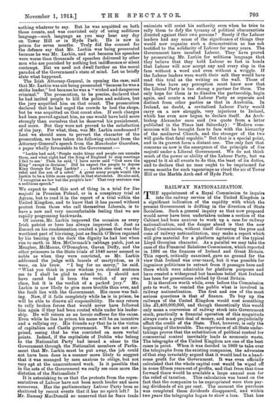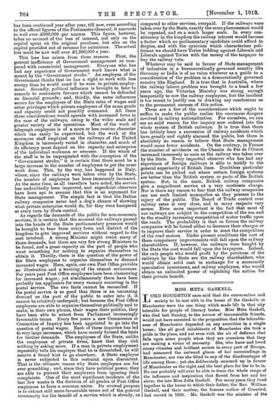RAILWAY NATIONALIZATION.
THE appointment of a Royal Commission to inquire
into the railway service of the United Kingdom is a significant indication of the rapidity with which the present Government is drifting in the direction of State Socialism. Such a general inquiry as that now proposed would never have been undertaken unless a section of the Cabinet had been anxious to work up a case for railway nationalization, and the danger ahead is that the new Royal Commission, without itself discussing the pros and cons of railway nationalization, may make a report which will give material for a platform agitation of the typical Lloyd Georgian character. As a parallel we may take the case of the Financial Relations Commission, which reported in 1896 on the finances of Ireland and Great Britain. This report, critically examined, gave no ground for the view that Ireland was over-taxed, but it was possible for ingenious politicians to extract from it passages here and there which were admirable for platform purposes and have created a widespread but baseless belief that Ireland has been for generations robbed by Great Britain.
It is therefore worth while, even before the Commission gets to work, to remind the public what is involved in railway nationalization. The first and one of the most serious questions is that of finance. To buy up the railways of the United Kingdom would cost something like £1,400,000,000, and though theoretically this would only mean a conversion of railway stock into Government stock, practically a financial operation of this magnitude always costs a great deal of money, and must prejudicially affect the credit of the State. That, however, is only the beginning of the trouble. The experience of all State under- takings proves that the substitution of political control for commercial control inevitably leads to economic waste. The telegraphs of the United Kingdom are one of the best cases in point. When it was decided in 1869 to take over the telegraphs from the existing companies, the advocates of that step invariably argued that it would lead to a hand- some profit for the Government. It was even officially calculated that the whole capital cost would be wiped off in some fifteen years out of profits, and that from that time forward there would be available a large annual sum for the relief of taxation. This calculation was based on the fact that the companies to be expropriated were then pay- ing dividends of six per cent. The moment the purchase was completed these dividends disappeared, and within two years the telegraphs began to show a loss. That loss
has been continued year after year, till now, even according to the official figures of the Postmaster-General, it amounts to well over £900,000 per annum. This figure, however, takes no account of the loss of interest, not only on the capital spent on the original purchase, but also on the capital provided out of revenue for extensions. The actual loss must be now well over £1,200,000 a year.
This loss has arisen from three reasons. First, the general inefficiency of Government management as com- pared with commercial management. Everyone who has had any experience of Government work knows what is meant by the "Government stroke." An employee of the Government thinks that he has a right to work with less energy than he would exert if he were in private employ- ment. Secondly, political influence is brought to bear to concede to consumers favours which cannot be defended on financial grounds ; and, thirdly, the same influences secure for the employees of the State rates of wages and other privileges which private employees of the same grade and capacity could not possibly command. All these three considerations would operate with increased force in the case of the railways, owing to the wider scale and greater variety of the operations. Most of the work of telegraph employees is of a more or less routine character which can easily be supervised, but the work of the enormous staff employed on the railways of the -United Kingdom is immensely varied in character, and much of its efficiency must depend on the capacity and enterprise of the individual workman or overseer. If the whole of the staff is to be impregnated with the conception of the " Government stroke," it is certain that there must be a large increase in the number of employees to get the same work done. This, by the way, has happened in Italy, where, since the railways were taken over by the State, the number of employees has been immensely increased. At the same time, as all travellers have noted, the service has undoubtedly been improved, and superficial observers have been apt to assume that this is an argument for State management. The simple fact is that the Italian railway companies never had a dog's chance of showing what private enterprise would do, for they were hampered at every turn by State control.
As regards the demands of the public for non-economic services, it is certain that the moment the railways passed into the hands of the State parliamentary pressure would be brought to bear from every town and district of the kingdom to give improved services without regard to the cost involved. A strong Minister might resist many of these demands, but there are very few strong Ministers to be found, and a great capacity on the part of people who want something for nothing to organize themselves to obtain it. Thirdly, there is the question of the power of the State employees to organize themselves to demand increased wages. Here, again, our own Post Office provides an illustration and a warning of the utmost seriousness. For years past Post Office employees have been clamouring for increased wages ; yet simultaneously there have been probably ten applicants for every vacancy occurring in the postal service. The two facts cannot be reconciled. If the postal service is so good that there is an unceasing demand on the part of the public to enter into it, it cannot be relatively underpaid; but because the Post Office employees are able to organize themselves politically and to make, in their own phrase, their wages their politics, they have been able to extort from Parliament increasingly favourable terms. Every few years a new Commission or Committee of Inquiry has been appointed to go into the question of postal wages. Each of these inquiries has led to very large increases, which have merely formed the basis for further demands. The employees of the State, unlike the employees of private firms, know that they risk nothing by asking more. If a man in private employment repeatedly tells his employer that he is dissatisfied, he will receive a broad hint to go elsewhere. A State employee is never subjected to this restraint upon discontent. That is the ultimate reason why State employees are for ever grumbling ; and, since they have political power, they are able to prevent their employers from ignoring their complaints. One of the most significant incidents of the last few weeks is the decision of all grades of Post Office employees to form a common union. Its avowed purpose is to extract still more favourable terms out of the general community for the benefit of a service which is already, as compared to other services, overpaid. If the railways were taken over by the State, exactly the same phenomenon would be repeated, and on a much larger scale. In every con- stituency in the kingdom the railway interest would become a factor which no parliamentary candidate could afford to despise, and with the cynicism which characterizes poli- ticians we should have Tories bidding against Liberals and Liberals against Tories with the money of the taxpayer to buy the railway vote.
Whatever may be said in favour of State management of industries in a bureaucratically governed country like Germany or India is of no value whatever as a guide to a. consideration of the problem in a democratically governed country like England. It is true that in Australia, where the railway labour problem was brought to a head a few years ago, the Victorian Ministry was strong enough temporarily to cow the railway employees, but the incident is too recent to justify one in drawing any conclusions as to the permanent success of this action.
These are a few of the considerations which ought to suffice to make the public realize the enormous dangers involved in railway nationalization. For ourselves, we can see no solid reason for the inquiry now ordered into the whole system of British railways. It is true that there has latterly been a succession of railway accidents which have greatly and rightly alarmed the public, but there is absolutely no reason to believe that State management would mean fewer accidents. On the contrary, in France the number of accidents on the Chemin de Per de l'Ouest increased immensely as soon as the railway was taken over by the State. Every impartial observer who has had any experience of foreign railways is able to testify to the general superiority of British lines. Doubtless particular points can be picked out where certain foreign systems are better than the British system or parts of the British system. But, in the main, British railway companies give a magnificent service at a very moderate charge. Nor is there any reason to fear that the railway companies can use such limited monopolies as they possess to the injury of the public. The Board of Trade control over railway rates is very close, and in many respects very severe. Even more important is the fact that most of our railways are subject to the competition of the sea and to the steadily increasing competition of motor traffic upon the roads. The probability is that in future the railway companies will be forced either to decrease their charges or to improve their service in order to meet the competition of the road motors. Under present conditions the cost of these compulsory improvements will fall upon the railway shareholders. If, however, the railways were bought by the State the cost would fall upon the taxpayers. Indeed, the only people who would profit by the purchase of the railways by the State are the railway shareholders, who would obtain solid cash in exchange for a necessarily speculative investment, and railway employees, who would obtain an unlimited power of exploiting the nation for their private benefit.































































 Previous page
Previous page